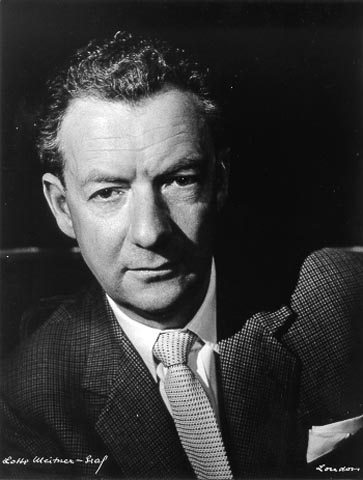On Britten’s 100th, Robertson, soloists and the St. Louis Symphony deliver an unforgettable “Peter Grimes” at Carnegie Hall

David Robertson, soloists and the St. Louis Symphony and Chorus performed “Peter Grimes” Friday night at Carnegie Hall on the 100th birthday of Benjamin Britten.
Benjamin Britten was born 100 years ago Friday and in Carnegie Hall last night the St. Louis Symphony and Chorus, conductor David Robertson and Anthony Dean Griffey, Susanna Phillips and Alan Held honored the composer with a concert version of his most celebrated opera Peter Grimes. The performance was beyond all superlatives.
Dean Griffey is the leading Grimes of our time. There is no one else at his level and his turn in the role in the Metropolitan Opera’s new production in 2008 — available on DVD — made him a star. The St. Louis Symphony is one of the finest orchestras in the country, and Robertson is an exceptional conductor with an insightful grasp of compositional architecture and the passion to drive intense playing. One would expect all these ingredients would produce greatness, and the evening was, indeed, a great one. But that word obfuscates more than it reveals.
With Peter Grimes, Britten became a composer of international stature and the finest opera composer of the twentieth century. Grimes is a masterpiece but it is not a perfect opera, having two crucial dramatic flaws. It is easy to see why Grimes, the lonely striver, wants to marry Ellen Orford (Phillips), the schoolmistress, but it’s impossible to see why Orford returns his affections. And we must take it for granted that Grimes and his neighbors are joined in mutual malevolence as the music doesn’t convince us and the plot, which begins with an inquest over the death of his first apprentice, lacks context.
This was a lightly staged concert, the singers in normal clothes that expressed their niche in society —Balstrode (Held) sports a classic fisherman’s cap and quilted jacket, Mrs. Sedley wears an evening gown and carries an umbrella — and they move around stage a bit, sitting and standing at times on a block. Grimes’ apprentice John goes off the cliff by climbing down the stairs stage-right and heading out the doors. The spatial relationships at the start of Act II, with Ellen and John sitting outside the church while services go on, was created by placing the church choir and organ at the back of the orchestra section. The sound worked and it created the implicit context that we were in church, part of the Borough, watching the tragedy unfold.
Without costumes and sets, Griffey’s characterization is exposed, and at first it’s not convincing. His boyish tenor is too beautiful to be the sound of a pariah, tragically unsocialized by the vicious cycle of his ostracism from and reaction to the ‘good people’ of the Borough. He has neither Jon Vickers’ mania nor Peter Pears’ diffidence. He seems just sweet and confused at first. But then he stumbles into The Boar, the local bar, during a wild storm. Griffey sings “Now the Great Bear and the Pleiades” like a prophet, speaking difficult truths to an indifferent public. That moment galvanized the concert and launched it from a performance into an intimate and intense personal experience.
Grimes is a masterpiece because the music surpasses the need for finely tooled theatrical perfection. Montagu Slater’s libretto works dramatically but it’s not especially singable. Britten overcomes this with his craft for unexpected but convincing melodies, and especially his unique sense of harmony. It’s the most powerful tool an opera composer has and he moves in and out of simple and complex harmonies, pushing different tonalities against each other. Britten is ambivalent about his characters and his drama, we hear this in his harmonies, which hold together disparate and irreconcilable elements. The music and the characters are complex but deeply human.
Susanna Phillips’ Orford and Alan Held’s Balstrode, Grimes’ only friends, equalled Griffey in both the beauty of their sound and the humanity and intimacy of the characterizations. They are the only people Britten feels full sympathy for, doing their best in impossible circumstances. They dominated in their foremost moments in the drama — Orford minding John at the start of Act II, Balstrode doing his best to help Grimes and finally showing him the only way out in Act III — and did so through the simple clarity and power of their vocal expression.
The prime stars of the night were Robertson and the orchestra and chorus. It is impossible to recall or imagine more emotionally riveting music-making than that heard in Carnegie Hall Friday night. Every instance of sound was both brilliantly musical in the abstract and an intensely affecting expression. All clearly flowed from Robertson, who laid down a perfect pace, shaped the dynamics with expert proportions and was the fountainhead for the rich and gripping communicative power.
This was the ne plus ultra of Britten’s sound, its mixture of homogenized orchestral texture with spotlit solo instruments, the judicious weight of strings and brass. The famous “Sea Interludes” were incredible, and they alone would have made for a landmark event. There is no audio or video recording of Peter Grimes that can match this concert. Everything was stripped away but the music and the singing.
The cast was excellent in every part, secondary and tertiary, all the voices beautiful and clear. Even the Nieces — Leela Subramaniam and Summer Hassan — were a pleasure to hear, and everyone was fully in character. Meredith Arwady was a boosterish Auntie, KeithBoyer a mellifluous rector, Nancy Maultsby an irritating Sedley. Liam Bonner ’s Ned Keene was a charming buffoon, Thomas Cooley a bug-eyed Bob Boles, Patrick Carfizzi and David Pittsinger strongly matched as the stolid lawyer and carter, and Garrett Boyer, in the non-singing role as John, held the stage.
The mounting power of the concert made the rising and falling sigh of chords that open Act III overwhelming, perhaps seeking to console us for the wrenching emotions that were to come. As Peter Grimes moved towards it’s conclusion, it had the affect of reaching out to the listener with a tender but insistent urgency. When a fisherman stood up from the chorus to remark that “there’s a boat sinking out at sea/coastguard reports,” the playing and singing transmuted the story of a distant village into a personal experience, a human and humane mess of love, anger, death, hate, companionship and alienation. The final double-bar has not put an end to the unforgettable, abrading effect.
Robert Spano leads the Atlanta Symphony Orchestra, chorus and soloists in Britten’s War Requiem, 8 p.m., April 30, 2014. carnegiehall.org



Posted Nov 24, 2013 at 5:43 am by Robert W Campbell
BRAVO!
Posted Dec 15, 2013 at 12:53 pm by Mike Haller
I’ve seen Grimes about 6 times starting with Jon Vickers in San Francisco in the 70s and Griffy’s recently at the Met. It is certainly my most favorite opera and maybe favorite piece of music. This was the best ever. I cried throughout. Thank you Mr. Britten.